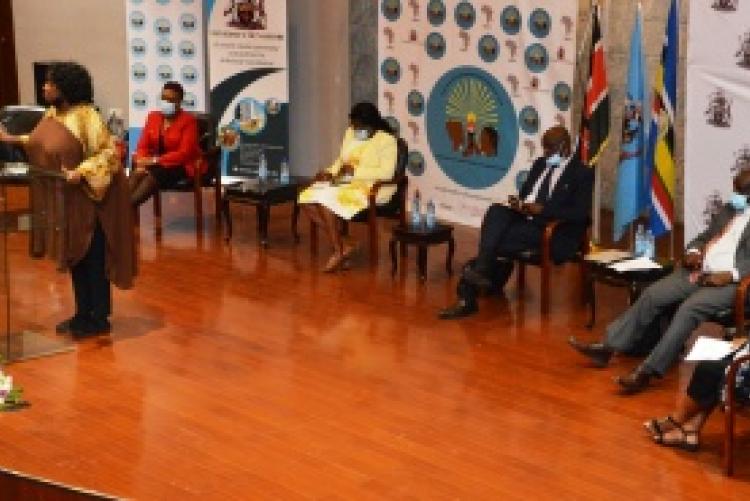The inaugural women’s economic forum took place on 24th and 25th February 2021 and sought to advance the empowerment of women through panel discussions, networking and keynote addresses from high-ranking government officials, development partners and industry leaders. This year’s forum tackled six thematic areas including Agribusiness, Manufacturing and Value Addition, Financial Access, Technology and Innovation, Entrepreneurship and Tax and Policy Regimens.
The panelists included Philippa Grosland Taylor (Country Director - Care International Taylor), Ms. Lisa Stadelbauer (High Commissioner for Canada to Kenya), Beatrice Elachi (CAS Public Service and Gender), Elizabeth Adongo (Senior Policy Advisor – Public Service and Gender Ministry), Prof. Wanjiku Kabira (University of Nairobi), Daisy Amugade (CRAWN Trust), Dr. Patricia Murugami (CEO Breakthrough Leadership Transformation), Dr. Lusike Wasilwa(Dir Crop Systems – Kalro Secretariat ), Nyakan June (CEO/Founder Timeless Woman of Wonder Organization), Dr. Esther Kathure(Senior Lecturer – Technical University), Ms. Mary Muthoni (CEO/Founder – Women in Business ),Dr. Linda Musumba (Musumba & Co. Advocates), Mr. Ronald Inyangala (Manager Credit Guarantee Scheme – National Treasury) and Mr. Paul Samoei (Senior Manager Research and Development - KNBS)
The empowerment of women is the cornerstone for sustainable development goals. In Kenya women hold positions that were deemed inconceivable 50 years ago; we have women engineers, architects, doctors, lawyers, and CEO’s in all kinds of industries. The inclusion of women in all kinds of jobs positively impacts the growth of the economy yet there lacks an enabling environment to support their full and equal participation.
These systemic gender inequalities have been deepened by the onset of COVID- 19; the pandemic has reversed the progress made towards economic justice, equitable access to healthcare and diminished women’s participation in the public space. Leaders have overlooked women’s needs and their decisions are rarely informed by women’s perspectives and their experiences; their COVID-19 responses have greatly overlooked women’s needs. There is little to no understanding of the effects the pandemic has had on the marginalized.
Women barely have a say when it comes to the decisions made in their households or even those made in government. For example, women comprise 70% of the global health and social workers yet they hold a limited number of decision-making positions.
Women in Kenya continue to be vulnerable in the face of COVID-19 as they account for 75% of Healthcare Workers making them more likely to contract the Virus as opposed to their male counterparts. The burden of caring for the ill and elderly also falls on women; women have to balance between caring for the ill, the elderly, their children and handling household tasks.
In addition to the responsibilities at home, these women have to make time for their jobs. A majority of them are employed in the informal sector as domestic workers or owners of small/micro enterprises. The informal sector is characterized by daily and low wages and little to no social protection measures e.g. maternal healthcare and school feeding programs.
In a bid to ensure women have an equal playing field to that of men, Canada launched the Women’s Voice in Leadership Program. This was in collaboration with CARE International, Community Advocacy and Awareness Trust (CRAWN Trust), Centre for Rights Education and Awareness(CREAW), Uraia and Urgent Action Fund Africa. The Women Voice in Leadership program aims to improve governance management, programming and sustainable women’s rights organizations so they can deliver quality services and increase the effectiveness of women rights platforms.
CARE International has also contributed to the empowerment of the marginalized through capacity building of women and girls living in urban informal and rural settings. These communities have benefited from interventions such as financial/educational literacy, rural sales agents, micro enterprise development, linkages to formal financial institutions, market engagements and poverty graduation models.
Kenyan women entrepreneurs have access to the Women’s fund and the Uwezo fund. These funds have played a part in transforming livelihoods by offering affordable and innovative business support services to local women. Women have access to subsidized credit, they can acquire entrepreneurial training, their enterprises including micro, small and medium enterprises can secure investments (e.g. business markets that will be of benefit to the women) and they have access to a domestic and global market for their products and services.
The role of devolution in providing women living in the rural settings access to Huduma Centres cannot be ignored. Women in rural settings have access to vital government documents such National Identification Cards and Certificates of Birth and access to government services such as registration of welfare groups and NHIF registration and claims.
- Log in to post comments

